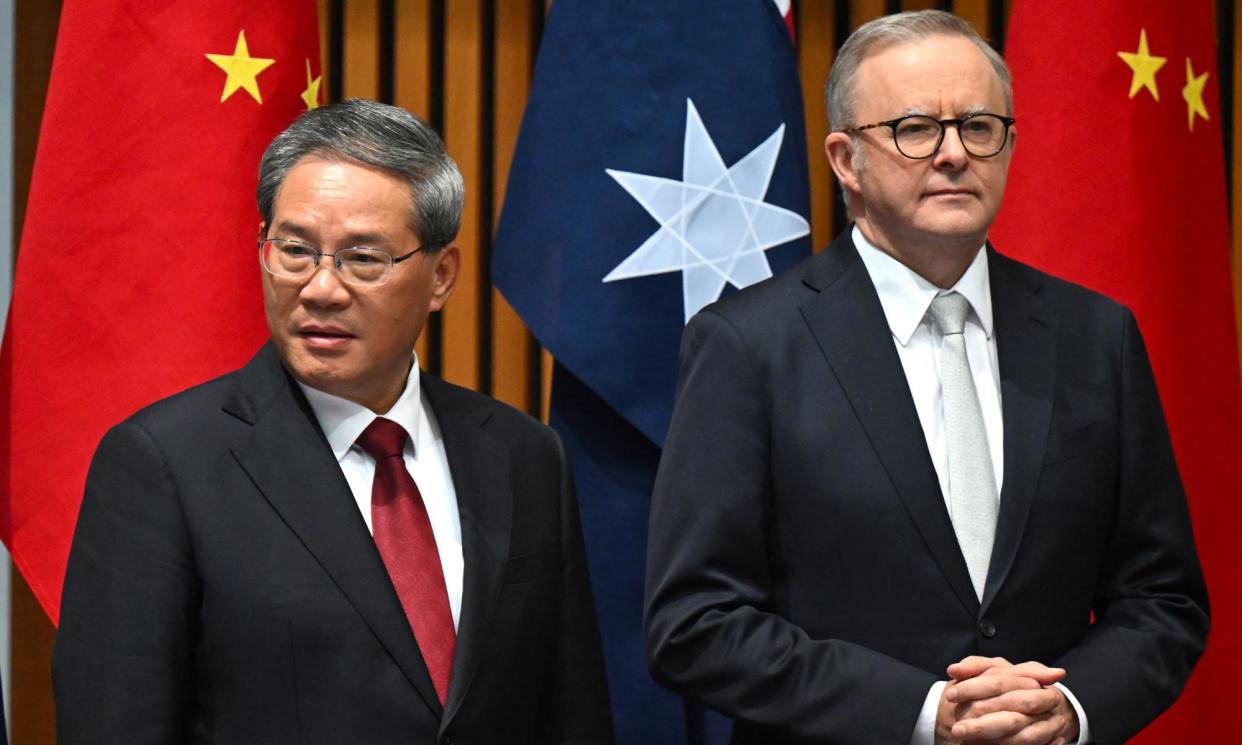Chinese premier’s Australia visit overshadowed by officials’ apparent attempt to block Cheng Lei’s view at event

The Australian government has rolled out the welcome mat as China’s premier, Li Qiang, visited Canberra, but his trip may have been overshadowed by an apparent attempt by Chinese officials to block the view of the formerly detained Australian journalist Cheng Lei during a signing ceremony.
The first trip to Australia by a Chinese premier in seven years is the most striking symbol yet of the easing of tensions in a previously turbulent relationship.
Related: ‘Thanks for the free rent’: Cheng Lei jokes about China detention in comedy debut
On Monday the prime minister, Anthony Albanese, strongly backed the need for “mature” dialogue between the two nations and hailed the progress made so far. But he gently rebuffed calls from the Chinese government to “shelve” their differences.
“We won’t always agree – and the points on which we disagree won’t simply disappear if we leave them in silence,” Albanese said.
The formal events in the nation’s capital began with a ceremonial welcome on the Parliament House forecourt, including a 19-gun salute and an opportunity for Li to inspect the guard of honour.
As the Chinese and Australian national anthems were played, Li and Albanese stood on a podium facing out from Parliament House from where the two leaders would have had a good view of two distinct groups gathered about 200 metres away on the lawns.
A patriotic pro-China group included people waving Chinese and Australian flags in support of the visit, while others, holding Tibetan flags, protested the visit on human rights grounds.
“Free Tibet” chants from the anti-visit demonstrators could be heard during the ceremonial welcome; and protesters also held a large sign declaring: “Human rights, not for sale.”
After Albanese and Li held their annual leaders’ meeting, the pair attended a media event where officials and ministers signed a series of agreements, including ones to deepen economic dialogue and cooperation on the climate crisis.
Cheng, who was detained in China on ill-defined national security-related accusations from 2020 before finally being released late last year, attended the event in her capacity as a presenter and reporter for Sky News Australia.
She sat with fellow Australian journalists in the seats set aside for media representatives. As the agreements were being signed, a Chinese embassy official stood in a position in front of Cheng but looking towards the official proceedings.
Australian officials repeatedly asked the Chinese embassy official to move, initially politely. After these requests were rebuffed, an Australian official was heard to say: “You’re standing in front of my Australian colleague – you must move.”
A fellow Australian journalist then offered to swap seats with Cheng, resulting in her moving two seats to the right. When another embassy official appeared to move around to try to get close to Cheng, Australian officials blocked the path.
Albanese and Li proceeded to give their statements to the media, in a format that did not allow journalists to ask questions.
Cheng later told Sky News she believed the officials were trying “to prevent me from saying something or doing something that they think would be a bad look, but that in itself was a bad look”.
She said the Australian officials “behaved courteously” whereas the Chinese embassy officials were “willing to go above and beyond the line of decency”.
Cheng said the “musical chairs” had distracted her and other journalists from doing what they were there to do – report on the content of the announcements.
Comment was sought from the Chinese embassy.
Albanese later held a press conference where he was asked whether the attempt to block Cheng from the view of cameras was acceptable in “the heart of Australia’s democracy”.
The prime minister said he had not seen the incident.
“I saw Cheng Lei and we smiled at each other during the event,” Albanese said. “It’s important that people be allowed to participate fully and that’s what should happen in this building or anywhere else in Australia.”
Albanese said he had raised with Li “the full range of Australia’s interests”, including unsafe incidents involving China’s military and the case of the detained Australian writer Yang Hengjun.
The prime minister said he made clear to Li that foreign interference in Australia’s political system was “not acceptable” and had raised human rights issues.
Albanese said the leaders had also spoken about improving military-to-military communications “so as to avoid incidents”.
Li was feted at a state lunch in Parliament House’s Great Hall, where Albanese called for “a secure and stable region” and said it was “always better if we deal direct with each other”.
Related: China lifts most remaining trade bans on Australian beef exports
Albanese stumbled at the opening of the speech in saying it was his honour “to welcome you, your excellency, Premier Li Keqiang” – using the name of Li’s predecessor.
The opposition leader, Peter Dutton, conveyed “the Coalition’s warm wishes to the people of China”.
Dutton, a former defence minister who in 2021 predicted Australia would join the US to defend Taiwan in the event of war, told the lunch event on Monday he hoped the “tensions of recent years can ameliorate” and lead to “stability and peace”.
Li thanked Albanese and Dutton for their “heartwarming toasts” and said he was “deeply touched by the good [wishes] for steady and robust development of China-Australia relations”.
The Chinese premier confirmed he and Albanese “had a candid exchange of views of some differences and disagreements and agreed to properly manage them”.

 Yahoo News
Yahoo News 
